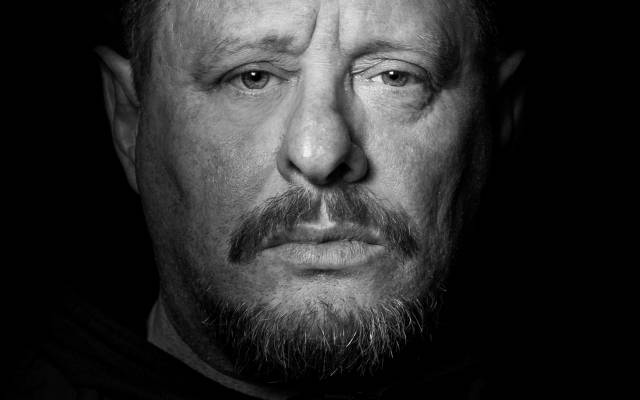Shaun Ryder laughs when I ask how he is. ‘I’m alright, yeah. Breathin’!’ I enquire because the former bad boy now loveable rogue, one perilously close to achieving national treasure status, has a myriad of health problems I keep reading about. Hip and thyroid troubles, his body doesn’t produce testosterone as it should, and he self deprecatingly calls himself Uncle Fester due to sudden unexplained hair loss.
‘Gone a bit wonky. Dangerous age, fifties, for men,’ he says with a chuckle and a sigh.
Despite his maladies, The Happy Mondays and Black Grape frontman is affable and relaxed and chatty. We’re on a hard fifteen minute cut off but he stretches it out much longer; ever the rebel, he evidently still lives outside the law. Ryder as the wild man of Madchester, the hell-raiser, his crack and heroin taking reputation of old is well earned, yet on the flipside it no longer feels odd nowadays to see him accepted in polite society. On daytime telly or chat shows he’s good value for money, opening up on Loose Women or sharing feelings with Holly and Phil on the This Morning sofa.
Shaun balances on a clever tightrope. He’s respectable – sort of – Faber & Faber publishing a book of his lyrics Write For Luck last year, in the same series as lyric books from Scott Walker and Jarvis Cocker, but is a bit of a rascal too with legal wrangles and tax problems on his CV. Does he mind the lovable rogue tag?
‘It’s better than being the fucking loser crack head junkie, innit. I’ll take that. I’ll take lovable rogue over ‘orrible junkie.’
He’s clean living now (‘I’m pescatarian. I can’t stop eating fish’) and a hands-on family man. His young daughters with second wife Joanne educate him about contemporary pop music, he tells me with amusement.
‘If you ask me about the new bands coming up I don’t have a clue until my girls get into them. We’ve got Capital radio on all the time so I get to listen to what they listen to,’ he announces affectionately.
His ‘going out’ is when he goes to work, namely playing shows and more recently doing live Q&As. He’s carving a niche for himself as a witty raconteur, talking frankly to audiences up and down the country about his eventful life.
‘It’s great, you know? Sitting there for about an hour and a half talking about yourself is (laughs) super sized big head! But it’s great and it’s funny. One side are Guardian readers, the other side read The Sun and smoke spice. And so we’ve got a fucking mad thing going on there. Some nights the audience overpower the other depending on where you are. They’re all talking about fucking drugs.’
Does that wear a bit thin, the drug talk?
‘It all depends. You can look out sometimes and everyone there are chewing their lips, coked-up, they’ve all been good fun. Some nights they want to talk about drugs, I’ll talk about me and drugs. And then other nights which can be really boring what music we write songs in, is it the key of e or b minor. “What things on your guitar did you use when you recorded Bummed.” That can be really fucking boring.’
We start our conversation proper by going right back to the beginning of his music-making. He has always been unashamedly ambitious, The Happy Mondays approached making the band work as a business from day one. By signing up to the Enterprise Allowance scheme in 1980s they in effect became entrepreneurs, despite the many financial and personal problems to come later.
‘You got a year out of it. Instead of getting seventy quid a fortnight you got that a week and you had a year to set up your business and if you didn’t you were stuck. You couldn’t claim anything for two years,’ he recalls of the scheme.
‘So when we was on it, it was guys setting up their shoe selling business or people going into selling flowers and we was setting up a band. It was a time when there was no jobs and Thatcher came up with the EA Scheme. We went on it because we got more money. And we didn’t want a job anyway.’
You wanted to be pop stars.
‘Yeah. We wanted to be a well-known band and not just in the music press, we wanted to be a pop band. The Beatles, Stones, The Kinks, they was pop bands and we wanted to be that as well. We wanted to be in the charts next to Duran Duran.’
Being with Tony Wilson’s Factory Records early on due to the ‘it’s not what you know it’s who you know situation’ in Manchester, Shaun admits at first the Mondays released records way before they were ready. The band had only just started to play their instruments and he was at an embryonic stage with his lyric writing.
‘All the stuff I was writing that was coming out on vinyl, nobody should’ve heard that,’ he confesses. ‘You can’t turn around go, “I’m not going to do that, I don’t want to make records”. We had to say yeah. I was learning how to write, I was learning about choruses and verses and so on.’
Shaun agrees his era was the last one where artists could fail creatively or commercially and still be given more chances, but points out Factory’s indulgence.
‘That was what was good about Factory. I’ve said this before but when (Paul) Oakenfold produced Pills ‘n’ Thrills (and Bellyaches), no one knew who Oakenfold was, even Tony (Wilson) didn’t know. Oakenfold wasn’t my mate as he is now, he was a guy who DJ’d in London. He did a club night in Ibiza. First it was “oh no”, (but) we managed to persuade them….we did have to fight for it a little bit. But any other record label wouldn’t have allowed that.’
It’s interesting to hear about that sense of freedom, but the Mondays forty years ago also freed themselves of self-imposed restrictions. The then young men eschewed music snobbery and the too cool for school mentality, mashing indie-pop guitar with dance rhythms, nods to house, techno, psychedelia, funk and the less hip, embracing a fondness for Mud and Showaddywaddy.
‘When we was growing up, you were either a mod or a rocker or suede boy or a fucking boot boy or whatever it was. One of the things that brought all the Mondays together was because we all had mad taste in music. I’m not bothered about standing up and saying I like Bowie, but I also like middle of the road hits from the 1960s.’
Those days were socially restrictive in many ways. He talks about how as a lad from Salford, ‘you’d literally get your balls cut off with a Stanley knife’ if you came to Liverpool, but late 1980s E culture changed all that. A slightly romantic view to take, one can’t help but think. To say his creativity has been hampered by his notorious drug use is an understatement.
‘I went through writer’s block for a long time. Drugs are great when you start off, when you’re young and just playing with them that’s fantastic. But when you get a hardcore habit, I got writer’s block, couldn’t do anything,’ he admits. ‘I did kick it all at forty, that’s what seventeen years ago. It’s like anybody really I grew up with the Rolling Stones sticking Mars Bars inside people, Beatles getting high on drugs, LSD and everybody grows up through that. If you don’t die, you get bored with it. It ends naturally.’
But the way he creates now isn’t massively different (‘I’m still writing about the same old shit’) and Ryder’s lyrics cut through the crap, savagely and with cutting wit as much as ever. A couple of years off sixty he may be, but his way of summing the world up remains familiar. In Everything You Know Is Wrong from’s 2017 album Pop Voodoo, he scolds ‘Donald Trump…the biggest lie in the world is on top of his fucking nugget…’
‘I’m still influenced by the same stuff, which is everyday conversation or what’s on the news or what I hear somebody say or what I read in the paper. Only now I’ve got YouTube and the internet to choose from as well. So I’m not really stuck.’
He’s always been on point with his lyrics yet Shaun struggled with formal education, leaving school without knowing his alphabet. Conditions like dyslexia and ADHD weren’t a thing then.
‘When we started (playing gigs at) universities I was really embarrassed about that because I was inferior, I felt inferior. I felt inadequate, I’m here singing at university to all these smart people. I’m just this scally fuck stringing a few words together, I’m not good enough. That feeling started at school, by the time I left school not feeling good enough was replaced by drugs which made me feel good.’
Feeling good these days is down to family and a sense of stability. Financial stresses were relieved in part by the unashamed embracing of the opportunities opened up by reality television. It’s a logical follow on from Ryder courting tabloid newspapers throughout his career, playing the game very cleverly. At the height of Madchester you’d maybe not imagine him down the track munching on kangaroo testicles on prime time telly with fussy nutritionist Gillian McKeith tutting in disapproval, but such a thing happened, tying in with the Mondays’ ambitions for mainstream success.
‘If you go on one of these shows and kids are sat there and you mention you’re in a band called Happy Mondays and the kids got their iPad with them or their phone, put your name in there and the next thing every one of your albums is downloaded, listened to. It’s a way of finding a new fanbase. Our fanbase goes from seven years old to seventy odd years old.’
And so, Shaun Ryder has come full circle. Achieved the household name success and acceptance he was after from the get go. A biopic Twisting My Melon based on his autobiography is in production, a testament to his popularity. Does he have any regrets about the journey he’s taken?
‘Only a few. Like 14 years in receivership. I regret that, but I don’t think about it too much. It’s one of those things that could have been easily avoided if I wasn’t so pig headed. There’s only a few things.’
Because life’s too short for regrets?
He gives out a wry laugh.
‘Oh god, yeah!’
Shaun Ryder will be touring his Q&A this February and March around the UK. He speaks as part of Words Weekend at The Lowry in Salford, 27 – 29 March.
http://www.wordsweekend.com/




